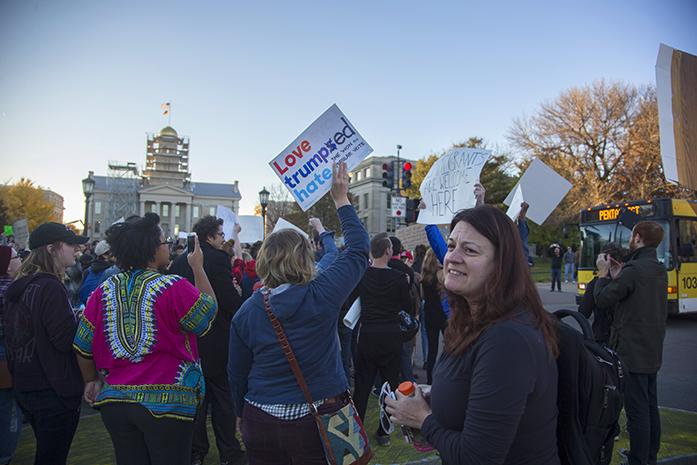By Hanna Soyer
Since Election Day, I’ve heard and read of far too many instances involving threats and bigotry toward marginalized communities.
A friend is part of the LGBTQ fraternity here on campus, Delta Lambda Phi. Two days after the election, one of his fraternity brothers received eight different hateful comments and threats on his Instagram. My African-American cousin has had people bring the Confederate flag into his place of work and say that they refuse to be served by him. My Russian and disabled friend received a message the morning after the election telling her that she does not belong here and that she should go back to Moscow because she is a drain on our government. My brother’s friend, riding the subway in D.C., was grabbed by a man and told “now that Trump is president, I can do whatever I want, and you’re lucky you’re not prettier, or I would right now.” I’ve heard of numerous people of different ethnicities, living here in Iowa City, who have received notes calling them “terrorists” or the N-word, telling them to leave, all of which has been documented in photos of the notes posted on Facebook.
These things are happening, they cannot be ignored, and they need to be stopped.
I also know people who believe all the fear and protesting in response to the election to be melodramatic. They claim that those who are feeling threatened or scared for their futures should “suck it up.” But, asking for those who feel fearful to stop complaining or to simply be positive is asking them to be silent. Silence is something that so many minorities have been told to do for far too long.
I urge everyone who feels uncomfortable by those of us who have voiced our fears to consider this: Why do you feel uncomfortable? Why do you not want to hear what we have to say? Because in doing so, you have to reconcile your own complacency and apathy? Because in doing so, you have to acknowledge that your vote helped make this a reality? This is not an accusation, this is just an honest question and an honest plea to look hard at your own beliefs and your own actions or lack thereof.
I know people who have said they are frustrated that people are “complaining” instead of coming up with actual solutions.
My response to that is this: People are organizing, and people are trying to come up with ways to move forward. But at the same time, many of us are incredibly scared.
This fear is not lessened by claims that we do not have the agency to voice our concerns and it is our sole responsibility to fix this.
A solution I would like to propose: Those who feel comfortable with a Trump presidency should acknowledge their privilege. Individuals who do not have to constantly think about their skin color, religion, sexual orientation, disability status, and gender need to listen to those of us who are not feeling safe. Privileged individuals need to offer support and protection rather than simply brush off what is happening. This is everyone’s responsibility.
What absolutely cannot happen is for these voices to be silenced. This country cannot accept these recent acts of violence and hatred as a new reality. We need to stop them, let society know that this is not acceptable and that we have minorities’ backs. We do this by talking, by listening to those who are feeling threatened, and by taking a stand. We cannot become desensitized.










